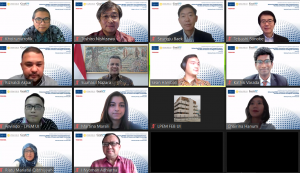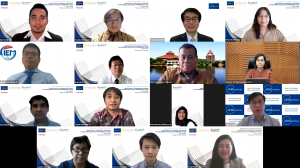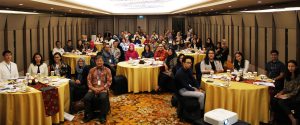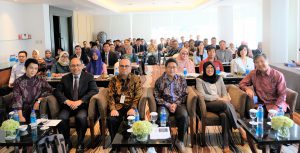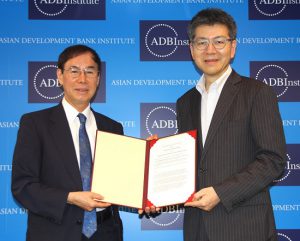申し訳ありません、このコンテンツはただ今 English のみです。
This is a summary report of the ADBI-GraSPP-University of Indonesia policy dialogue on “Impact investing for a Transition towards Zero-Carbon Society in Asia” at Hotel Borobudur in Jakarta on February 23, 2023.
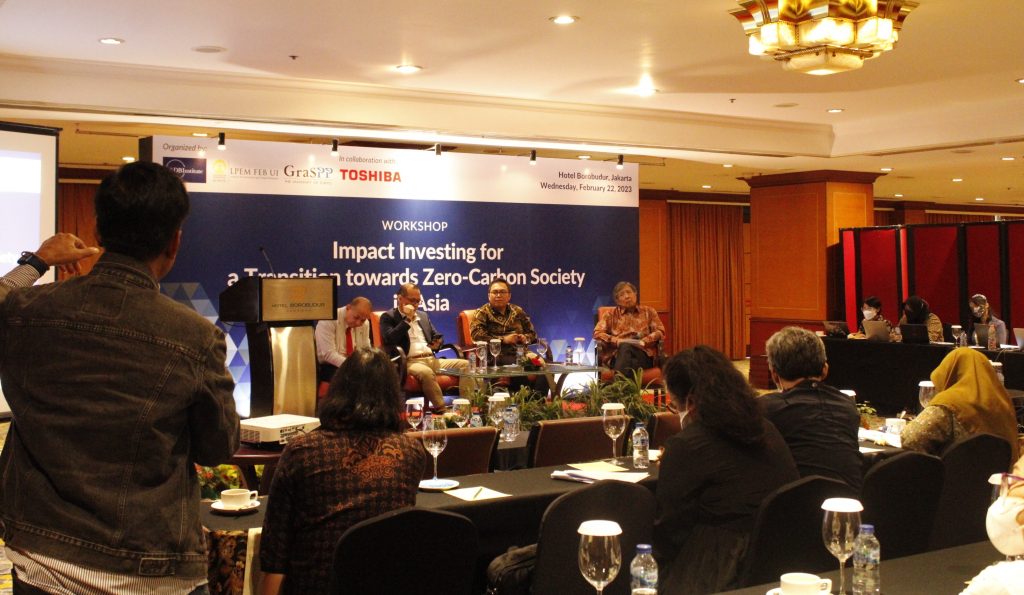
GraSPP hosted the event jointly with the Asian Development Bank Institute (ADBI) and Institute for Economic and Social Research, Faculty of Economics and Business, University of Indonesia (LPEM FEB UI) as policy dialogue under the Indonesia-Japan Policy Research Forum for Asia with the financial support of the Toshiba International Foundation (TIFO).
The event attracted 78 participants, including speakers from Australia, Hong Kong, Indonesia, Japan, Korea, and Singapore.
Background
The COVID-19 pandemic and global-scale natural calamities have reminded us of the emergence of a massive threat to humanity. Climate change and the pandemic can overwhelm the capacity of ecosystems, and their adverse consequences affect people’s livelihoods. Therefore, a blueprint for a sustainable, inclusive, and resilient recovery from the COVID-19 pandemic should be designed and shared by incorporating the way to address the overwhelming challenges to the ecosystem and humanity. These challenges are necessary for any blueprint to lead to a sustainable, inclusive, and resilient recovery or lasting human prosperity.
Against this backdrop, Indonesia-Japan Policy Research Forum for Asia focuses on climate change and impact investing practices to bring about a transition towards a zero-carbon society in Asia. Impact investing is a growing practice to generate positive social and environmental impact alongside a financial return. Indonesia is one of Southeast Asia’s most promising impact investing markets, as shown by the size of impact capital deployed by private impact investors and development finance institutions in the financial services, agriculture, energy, and manufacturing sectors.
The issue is relatively new to Indonesia and other Asian neighbors. Therefore, to the issue’s importance, LPEM takes the lead in organizing a workshop under the Indonesia-Japan Policy Research Forum for Asia in partnership with the ADBI and GraSPP. The primary target audience includes policymakers, practitioners, and academics from Indonesia, Japan, and other Asian countries. The workshop aims to help promote the sharing of knowledge and experiences between stakeholders from Asia and Japan.
Opening remarks
Dr. Teguh Dartanto, Dean of the Faculty of Economics and Business, University of Indonesia (FEB UI), delivered the opening remarks, followed by a video message by Dr. Tetsushi Sonobe, Dean and CEO of ADBI.
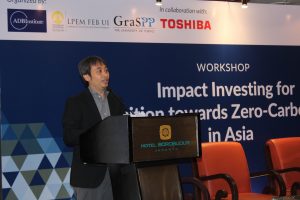
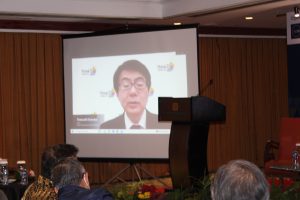
Dean Teguh stressed the role of impact investing in addressing the current state of environmental degradation and the need for increased allocation of resources to tackle global challenges. Also, he highlighted that the issue of sustainability is becoming top of mind for policymakers and young people. FEB UI’s internal survey showed that three topics attracted students’ interest: climate change, digitalization, and the environment.
Dean Sonobe emphasized the growing need to act toward a zero-carbon society in light of global-scale natural calamities as an emerging threat to humanity. He reminded us that our experience with the pandemic suggested the need for knowledge to be accompanied by action and for us to ask how to make our efforts effective.
Keynote remarks
Dr. Kiki Verico, Advisor to the Minister of Finance for International Trade and Industry, addressed the need to stop environmental degradation and the importance of balancing growth and transition towards a zero-carbon society. He stressed that the collaborative network between scholars, technocrats, and policymakers is strategically important in achieving net zero emissions globally. He illustrated hard truths facing us, such as the increased global temperature, the increased frequency and severity of extreme weather, the loss of world glaciers, and the rising sea levels. Since nature’s capacity has been degraded, Dr. Kiki urged policymakers to make commitments as the Indonesian government put the issue on medium- and long-term planning documents. He stressed that the more we commit to the environment, the more economic growth we can achieve because, without such commitment, we will face negative impacts on economic growth.
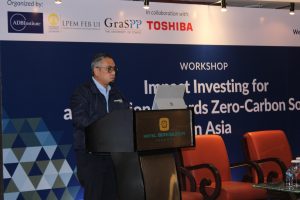
Session 1. The implementation of responsible investment and beyond
One of the definitions of responsible investment is “a strategy and practice to incorporate environmental, social, and governance (ESG) factors in investment decisions and active ownership.” The central notion is to reflect ESG information in investment decision-making to ensure all relevant factors are considered while assessing risk and return. The financial industry recognizes ESG integration as influencing risk-adjusted returns for investors. As an extension to this notion and beyond, impact investing emerges as an innovative practice to generate positive social and environmental impact alongside a financial return. Session 1 aimed to clarify the distinctions between these approaches, inform how the financial industry had developed them, and discuss their implementation to bring about a transition towards a zero-carbon society.
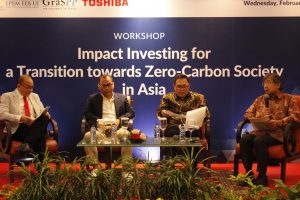
Moderator: Prof. Toshiro Nishizawa, GraSPP, The University of Tokyo
Speakers: Dr. Mohamad Dian Revindo, Associate Director, LPEM FEB UI
Mr. Riki Frindos, Executive Director, KEHATI Foundation
Dr. John Vong, Sustainable Finance Lead, Climateworks Centre
Prof. Toshiro Nishizawa opened the session by sharing his first encounter with the concept of “responsible investment” around 2005 before the Principles for Responsible Investment (PRI) was launched. He described the concept of responsible investment as “a strategy and practice to incorporate ESG factors in investment decisions.” Prof. Nishizawa illustrated how these concepts had evolved and become mainstream, and a new practice of impact investing was emerging to generate positive social and environmental impact alongside a financial return.
Dr. Mohamad Dian Revindo highlighted the need for impact investing and suggested examining if adopting impact investing practice was inclusive for all countries. He proposed strategies that included identifying potential investors, providing capacity support, and setting priorities based on Sustainable Development Goals (SDGs).
Mr. Riki Frindos shared his experience in introducing the various approaches to sustainable investment, including negative screening, ESG integration, green bonds, and impact investing. He illustrated an approach to implementing sustainable investment, such as launching the first ESG stock index in Southeast Asia, where investors could put their money into companies with their ESG performance analyzed by the KEHATI Foundation. He added that ESG stocks performed well in generating fees for the Foundation to support social projects.
Dr. John Vong shared his insights into ESG investing in the ASEAN region, the fastest-growing region in the world for the next decades. He highlighted a growing interest among young investors and large asset managers such as BlackRock to proceed with ESG finance. Dr. Vong argued that companies must create sustainable values, and then the policies and processes to ensure compliance should be in place, just like a risk management committee in companies today. He continued that, despite the need for a well-established decarbonization strategy in the ASEAN region, the current trend would soon make such a strategy common. He also stressed the importance of utilizing private funds and partnerships between the government, private actors, philanthropic funds, and multilateral agencies to realize a zero-carbon society.
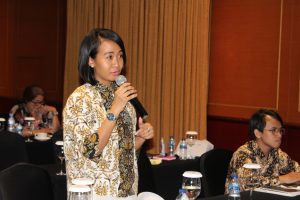
Keynote remarks
Dr. Noor Syaifudin, a senior policy analyst from the Fiscal Policy Office of the Ministry of Finance, stressed the importance of climate change impacts on our society and suggested that the transition should be just and affordable. He described Indonesia’s commitment to the transition should be aligned with efforts for capacity building and technology advancement to achieve successful results. He then illustrated Indonesia’s climate change mitigation approaches, such as the carbon tax, $5.4 million annual spending to address climate change, and the Ministry of Finance’s readiness to unlock resources if necessary. Dr. Noor concluded his talk by suggesting that by involving diverse community representatives in the project development process, developers can strengthen resilience and empower them to develop sustainable and resilient livelihoods.
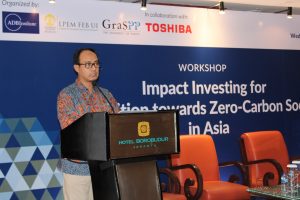
Session 2. Ecosystem of impact investing for a transition towards a zero-carbon society
All the living things in a particular field create an ecosystem of many different players and activities interacting with each other. It is the case in the area of impact investing, where asset owners, intermediaries, investees, government, and beneficiaries, among others, interact as stakeholders. Session 2 explored how such stakeholders should collaborate to maximize the benefits of impact investing for a transition toward a zero-carbon society.
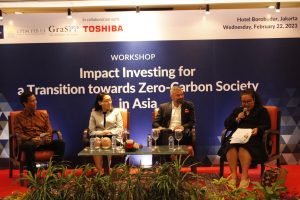
Moderator: Ms. Lydia Napitupulu, Lecturer, Faculty of Economics and Business, University of Indonesia
Speakers: Mr. Tristan Ace, Chief Programme Officer, AVPN
Mr. Edwin Syahruzad, Chief Executive Officer, PT Sarana Multi Infrastruktur (PT SMI)
Ms. Monica Bae, Director of Investor Practice, AIGCC
Mr. Edwin Syahruzad shared the agency’s experience as a special mission vehicle under the Ministry of Finance engaged in development finance in Indonesia. PT SMI introduced a blended finance scheme—a strategic use of development finance and philanthropy funds to mobilize private capital flows into Indonesia—to support a transition toward a zero-carbon society. He highlighted the importance of affordability for the people and the state for effective energy transitions and stated that policy guidelines and sectoral reforms would be required to enable impact investors to come into the country.
Mr. Tristan Ace shared the challenges we faced from an investor community perspective. Such challenges, he pointed out, including the mismatch of needs between local communities and investors in funding climate change adaptation and mitigation programs. He illustrated more precisely that there was a demand for adaptation projects from local communities in Asia, but Euro-American investors preferred to invest in climate change mitigation projects with measurable results. He also emphasized the importance of government support as it brings confidence, which is critical to investing.
Ms. Monika Bae presented various findings regarding net zero investments in Asia. She acknowledged that most investors were considering and preparing themselves for zero-carbon investment. Still, she admitted that most investors needed more time to be ready to take steps toward net zero investment. She illustrated several stages investors must follow, such as setting the target for net zero, identifying carbon-intensive activities, calculating carbon intensity, and aligning company strategies with the SDGs goals. She also suggested that carbon footprinting in practice should incorporate many elements, such as including SDGs in their ESG analysis, using peer-to-peer platforms to gain knowledge, and adopting internationally recognized standards and best practices.
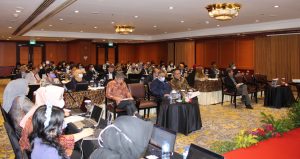
Session 3. Country experience in adopting impact investing for a transition toward a zero-carbon society
The session aimed to promote the sharing of knowledge and experiences between impact investing practitioners from Asia to seek insight into partnership opportunities to bring about a transition towards a zero-carbon society.
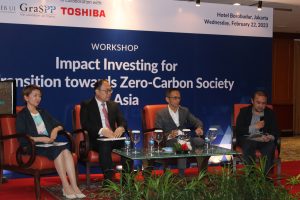
Moderator: Dr. Riznaldi Akbar, Senior Capacity Building and Training Economist, ADBI
Speakers: Ms. Chikako Matsumoto, Executive Officer, Sumitomo Mitsui Trust Bank
Prof. Suk Hyun, Graduate School of Environmental Finance, Yonsei University
Mr. Muhammad Yusrizki, Chairman, KADIN Net Zero Hub
Ms. Chikako Matsumoto shared her experience of impact investing in Japan. She admitted that the size of the impact investing in Japan and Asia remained very small in comparison to Europe and North America but pointed out that impact investing had been growing very rapidly in Japan in recent years. She named asset managers, venture capitalists, and Japan International Cooperation Agency (JICA) as the most prominent players in the market. To have rapid emission reductions from 2030 and beyond, she suggested investing in potentially beneficial new green technologies such as green hydrogen, ammonia, and batteries in the next decade.
Dr. Suk Hyun shared Korea’s experience with green bonds. He described how green bonds became popular in Korea among investors and the growing demand for such bonds enabled issuers to reduce the issuing cost (“greenium”) and pointed out that greenwashing emerged as a new challenge. He attributed the greenwashing in Korea to the nonmandatory guidelines for green bonds and suggested the need to strengthen information disclosure to enable investors to distinguish greenwashed bonds from real green bonds.
Mr. Muhammad Yusrizki argued that stakeholders should pay attention to the impact of zero carbon investment on Indonesian industries and specifically mentioned the demand side impact of investment in decarbonization, especially in the apparel and footwear industries.
Summary by graduate students
Ms. Karina Isna Irawan from the FEB UI and Mr. Hiroki Ito from GraSPP summarized the takeaways from the workshop. This summary report is based on their written record of full-day discussions.
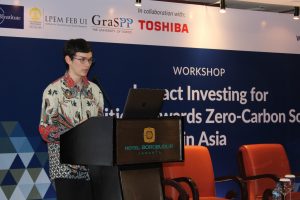
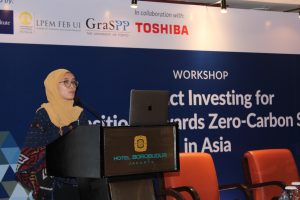
Concluding remarks
Three host representatives, Dr. Riznaldi Akbar, Prof. Toshiro Nishizawa, and Dr. Chaikal Nuryakin, concluded by reemphasizing the importance of impact investing to achieve a zero-carbon society and the need to create policies that would enhance, drive, and regulate impact investing as an effective way to finance carbon transitions. Prof. Nishizawa appreciated TIFO’s generous financial support and the active participation of the speakers and the audience in the discussion. He also expressed GraSPP’s commitment to the continued engagement in the ADBI-GraSPP-University of Indonesia policy dialogue and announced the next year’s focus being low-carbon green and blue economic development and action plans for the effective allocation of financial resources.
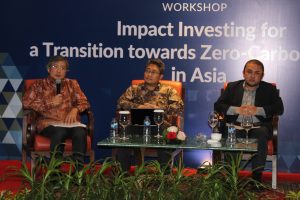
About the Forum
The Indonesia-Japan Policy Research Forum for Asia is a collaboration between the Asian Development Bank Institute (ADBI), Institute for Economic and Social Research, Faculty of Economics and Business, University of Indonesia (LPEM FEB UI), and the University of Tokyo’s Graduate School of Public Policy (GraSPP) with the support of the Toshiba International Foundation (TIFO), a public interest incorporated foundation. The Forum’s original format was a bilateral intellectual exchange between LPEM and its counterpart in Japan, which started in 2004 with the support of TIFO. Since 2017, the Forum has become tripartite by allying with ADBI.
February 23-24, 2022 online | “Enhancing MSMEs’ Innovation and Competitiveness: the Role of Finance and Digital Technology”
February 18-19, 2021 online | “Infrastructure, Technology, and Finance for Sustainable and Inclusive Development in Asia beyond the Pandemic”
November 7-8, 2019 in Jakarta | “Indonesia-Japan Policy Research Forum for Asia: Financial and Technological Literacy for Sustainable and Inclusive Development in Asia”
November 7-8, 2018 in Jakarta | “Indonesia-Japan Policy Research Forum: The Role of FinTech in Inclusive Growth in ASEAN Economies”
November 8-9, 2017 in Jakarta | “Innovative Approaches to SME and Entrepreneurial Financing for Enhanced Competitiveness”
November 23, 2016 in Jakarta | “Emerging Researchers Forum between Indonesia and Japan—Partnership Opportunities for Enhancing Human Capital, Innovation and Competitiveness—Financial Inclusion and SME Development”
December 2, 2015 in Jakarta | “Emerging Researchers Forum between Indonesia and Japan—Partnership Opportunities for Enhancing Human Capital, Innovation, and Competitiveness”
November 24, 2014 in Jakarta | “FDI for the Future: Human Capital, Innovation, and Competitiveness”
February 11, 2014 in Jakarta | “Human Capital Investment and Labor Productivity in Indonesia: Facts and Challenges in a Global World”
